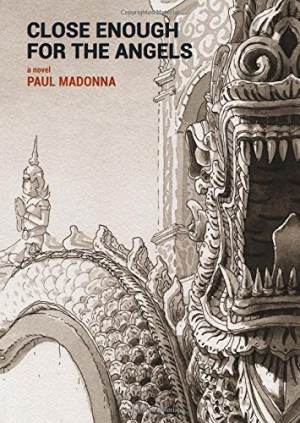Close Enough for the Angels
Close Enough for the Angels follows Emit Hopper, a former rock star, writer, and artist, along a twisting path to peace and self-discovery.
Close Enough for the Angels is mostly prose, but it features illustrations throughout—over one hundred in total. They’re not on every page, and sometimes they come in bursts of several at a time; the format is reminiscent of Brian Selznick’s, author of The Houdini Box and The Invention of Hugo Cabret, among other books—but Madonna’s work stands as uniquely his own.
Madonna’s ink-on-paper illustrations tend toward striking landscape and city scenes from Thailand, Japan, and China—all locations featured prominently in the story—but their true purpose, along with the fictional origin of the book itself, is revealed only near the end. Madonna’s prose, meanwhile, is magnificent as he tells the story of Emit Hopper, a man who finds himself experiencing repeating themes in his life.
Told in three alternating, expertly interwoven sequences, the book traces Emit’s first travels in Thailand, his early life and marriage, and his later life as an artist. Mysteries abound—some are ultimately revealed, others left tantalizingly unresolved.
Plenty of philosophical ideas are addressed throughout the book, but Madonna isn’t heavy-handed about it; many aspects are integral to the events of Emit’s or the other characters’ lives. The idea of dying and creating a new incarnation of oneself is seen in Emit’s changing his name, faking his own death, and in the many reinventions of himself—the same with his love interest, Julia Marie Rose, a former restauranteur and frozen-dinner magnate. The theme of repetition and the circular nature of life is noted by Emit: “It was as if, now that I had seen that life was nothing but a series of repetitions, a dam had burst, and one after another, every event, every thought, every thing was coming back.”
Close Enough for the Angels is a deeply satisfying, ruminative meditation on life seen through the eyes of appealing, but imperfect, characters—it is highly recommended.
Reviewed by
Peter Dabbene
Disclosure: This article is not an endorsement, but a review. The publisher of this book provided free copies of the book to have their book reviewed by a professional reviewer. No fee was paid by the publisher for this review. Foreword Reviews only recommends books that we love. Foreword Magazine, Inc. is disclosing this in accordance with the Federal Trade Commission’s 16 CFR, Part 255.

